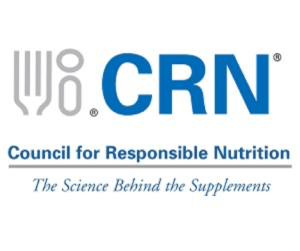
Regarding CRN's part in accomplishing this, Mister outlined 5 strategic objectives, and said everything CRN decides to do—or opts not to do—is evaluated against these objectives:
- Promote and expand self-regulatory initiatives that demonstrate an industry-wide commitment to accountability and responsible behavior to maintain and improve consumer confidence.
- Influence public policy by building and maintaining a positive legislative, regulatory and commercial environment for nutritional products to foster consumer confidence and industry growth.
- Foster excellence in nutrition science by identifying and promoting best practices in the design, execution, interpretation and acceptance of research that evaluates the benefits and safety of nutritional products and their ingredients.
- Improve the public perception and understanding of the safety and benefits of science-backed nutritional products to promote a positive industry image.
- Become a valuable provider of programs and services that educate and promote compliance with regulation and encourage member collaboration, while generating necessary resources for CRN.
Mandatory product listing: "The CRN decision to support mandatory listing is based not only on our experience with the Supplement OWL, but also on a thoughtful and deliberative process within our Board of Directors that led them to conclude that the heightened transparency created by a public listing of labels and products best serves our members and the industry."
Related: CRN on DSHEA at 25: The Industry is at a Crossroads
CBD:Regarding cannabidiol (CBD) Mister saidCRN is "urging FDA to use its discretion to give a green light to legally market these products and then require each manufacturer to demonstrate the safety of its own product through the NDI or GRAS notification."Related: Industry Associations Ask Congress: “Take Quick Action to Clarify the Legal Status of CBD”
Probiotics:Mister also discusseda proposal at Codex that aims to develop harmonized probiotics guidelines at the international level. "It would establish eligibility criteria at the international level for what it means to promote human health and wellbeing, as well as international criteria for determining the quality of these products and their labeling," he explained. "We see this as creating a potential trade barrier to give a few companies unfair advantage."Related: Dietary Supplements Regulatory Summit: Industry/FDA Unite; Discuss Future of DSHEA
Mister also discussed a concern: "Over the past year, we are finding ourselves increasingly at odds with some of our other industry associations...what I’m talking about here is not the problem of trade association consolidation or fragmentation—that’s an issue this industry has wrestled with for as long as DSHEA has been around. Rather, it’s trade association opposition—groups who are actively working against one another." Given that, Mister encouraged all to be sure they know what their associations are advocating for. "Be sure it aligns with your values, your company’s culture and the policy direction your company advocates for."WholeFoodswill continue to cover these issues and bring you perspectives from industry leaders. Watch for our "Industry Overview and 2020 Forecast" in December. Andcoming in 2020:Given the fact that members of the industry have varying perspectives and opinions on key issues,WholeFoodswill be launching a new column in our January issue:Debates, which will feature two experts discussing a different topic—such as mandatory product listing, CBD and probiotics—each month.










